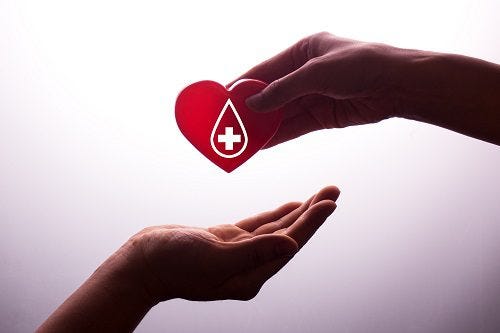Here Are Some of the Top Benefits of Donating Blood
If you could take one hour of your time to save lives, would you do it?
Well, remarkably, you can!
Benefits of Donating Blood
By donating one pint of blood, you can save up to three people. And if that isn’t enough to motivate you, there’s one more compelling reason to donate blood: It benefits you too.
Researchers and health experts have noted several health benefits of donating blood on a regular basis – and they’re in addition to the great feeling that comes from performing a life-saving act.
Blood Shortage

The U.S. needs about 36,000 units of red blood cells every day for people with chronic diseases, cancer patients, surgeries, traumas, and more.
When you consider that the average red blood cell transfusion is approximately 3 units, and a single car accident victim may require as much as 100 units of blood, you can see how vital donating blood is for those who desperately need it.
And when it comes to donating blood, both the giver and receiver win. Here are some benefits of donating blood for donors and receivers.
5 Ways Giving Blood Can Promote Health and Save Lives
- Attenuates High Iron Levels
Research estimates 16 million Americans have some degree of iron overload. Either inherited or accumulated over time, iron overload is most prevalent in white populations with a European background, and it’s more common among men.
Premenopausal women are largely protected from iron overload because of menstruation and pregnancy, but some women may begin to experience the symptoms of iron overload around menopause.
Excess iron mainly collects in the liver, heart, and endocrine organs, and as it accumulates, serious liver health, heart health, blood sugar, and hormonal problems may arise. Iron overload can cause major health issues, so it’s important to have your iron levels checked by a medical professional.
Most doctors will recommend iron reduction therapy for those who have too much iron. And the NIH has a blood bank donor program specifically for people who have iron overload. You can give your blood and help correct your own iron imbalance at the same time.
But there’s more.
In recent decades, several studies have examined the correlation of iron overload, reduced risk of cardiovascular health issues, and regular blood donation. The results have been promising.
One 2012 study involving patients with the trifecta of elevated blood pressure, high blood sugar levels, and heart health issues showed improvement with consecutive reduction of iron stores via blood donation. The study concluded that “blood donation may have beneficial effects for blood donors” in patients with high iron stores and all three health issues.
- May Improve Blood Flow
When you donate blood, your body replaces the lost blood volume within 48 hours, and all the depleted red blood cells are completely replaced within one or two months. This replenishing process may help your body stay healthy by working more efficiently and productively.
It’s also believed that regular blood donations may help your blood flow in a way that’s easier on the lining of the blood vessels, and could result in fewer blockages in your arteries. This could be one reason why a study in the American Journal of Epidemiology found that blood donors are 88% less likely to suffer a heart attack.
- Provides a Mini Health Check
To establish that you’re an eligible blood donor, you’ll first complete a quick physical exam that measures your temperature, pulse, blood pressure, and hemoglobin levels. After your blood donation is collected, it goes off to a lab where it undergoes several tests.
The tests will determine your blood type and whether you have a virus (such as hepatitis B or C, HIV, etc.). If anything comes back positive, you’ll be notified immediately.
Consider it a bonus health checkup. (Of course, you shouldn’t donate blood if you suspect you’ve been exposed to a serious virus or use these diagnostic services in place of a regular medical exam.)
- May Lengthen Your Life
If your intention is to help others with your blood donation, research shows that it boosts longevity. A study published in Health Psychology found that people who volunteered for altruistic reasons had a remarkably reduced risk of mortality four years beyond those who volunteered for themselves alone!
- Boosts Your Emotional Health
Although most people know this intuitively, the Mental Health Foundation reports that helping others can reduce stress levels, improve your general sense of well-being, help minimize or eliminate negative feelings, and provide a sense of belonging, which reduces isolation.
Become A Donor
These are just a few of the many benefits of donating blood. The beauty of the process is that it’s win/win for you and the recipient.
Keep in mind that even though 38% of the American population is eligible to give blood, only 2% donate. There’s room for many more to jump on board.
Check the Red Cross requirements to find out if you’re eligible.
At BrainMD, we’re dedicated to providing the highest purity nutrients to improve your physical health and overall well-being. For more information about our full list of brain healthy supplements, please visit us at BrainMD.
- Here Are Some of the Best Tension Release Exercises to Help You Feel Your Best! - April 17, 2024
- Foodscaping: How to Grow Healthy Foods In Your Own Garden! - April 12, 2024
- Eat Your Fruits and Veggies (Don’t Drink Them) - March 29, 2024



